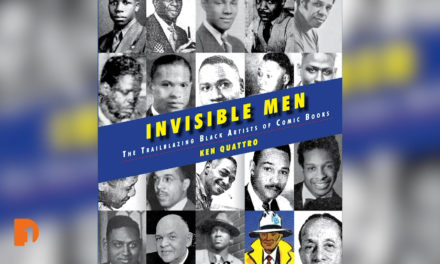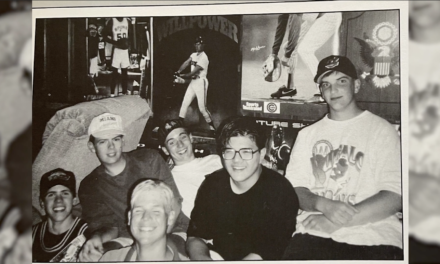Some of the biggest names in jazz are making an appearance at the upcoming debut of the Detroit Symphony Orchestra’s Paradise Jazz Series Big Band. From Terence Blanchard and Kurt Elling to the man directing the whole show, Grammy-nominated trumpeter and composer Kris Johnson, the 8 p.m. April 30 live and live-streamed performance will feature original arrangements created by Johnson.
Ahead of the performance, WRCJ 90.9 FM host Cecelia Sharpe sits down with Kris Johnson to talk about his upcoming role in and excitement for the Paradise Jazz Series Big Band debut concert. Plus, the duo discusses Detroit’s rich jazz history in celebration of Jazz Appreciation Month in April.
From Kris Johnson’s Facebook:
Full Transcript:
Cecelia Sharpe, Host, WRCJ 90.9FM: You’ve been across the world, around the world performing, composing, arranging, teaching, and you’re back here in Detroit. Coming up on April 30th, you will be leading, let me get this right, the Paradise Jazz Series Big Band, with special guests Kurt Elling and Terence Blanchard. And this is all under your direction. Talk about that upcoming concert.
Kris Johnson, Artist, Educator, & Composer: I have always had a dream of leading my own big band. For as long as I can remember, wanting to arrange for a big band, wanting to be a part of something larger than life. I remember when I joined the Basie Orchestra, I was so excited to be in that section, so excited to be a part of that group. But then I immediately was like, okay, I want to write for this group. That was the next ambition up. like great on playing trumpet, I want to write for this group.
So, I started submitting arrangements. So, it’s always been, I’d say, playing and writing have always had this dance with me and always been essential to who I am. And this opportunity came up and honestly, like, it’s almost like, why hasn’t this existed sooner? You know, to be able to have a group of young professionals from Detroit that are really representing the Paradise Jazz Series at Detroit. And so, we’re really honored to do that. I’m so honored that I was selected to be the musical director for this, and we’re going to have an absolutely fantastic performance. Terence Blanchard has long been my idol, my musical idol. Just, I look up to him so much.
I’ve been a huge fan for as long as I can remember and honestly has really influenced my career in many ways, especially his work in a film, his combination of being a bandleader and being an arranger, being a composer, so, I have an opportunity to share the stage with him. And of course, the great Kurt Elling, who’s going to be singing with us and all of the wonderful musicians that I’ve played with for years in different capacities to come together into this big band is going to be an absolutely dynamite experience. So, definitely don’t want to miss that one.
Cecelia Sharpe: Let’s back things up. How did you get started in music?
Kris Johnson: I come from a musical family. My dad was actually a bass player, my uncle, a keyboardist, and music was always around me. Like most of us in the African American community, especially in Detroit, I grew up in church just hearing music being exposed to it. But I honestly was a bit of a late bloomer when it came to actually latching on to performing music. You know, I took piano lessons like everybody else, kind of tried to sing in the choir, that type of stuff. But it wasn’t until my freshman year of high school that I started getting serious about music. And it was actually a mutual friend of ours and my mentor, Damian Crutcher, who really was the first person to see something in me and really believe in me and kind of instilled that like you can do this attitude.
He actually used to call me Professor Johnson. I’m talking about from like freshman and sophomore year on, it was always Professor Johnson, till this day. He kind of just saw that. He has this gift to see things in people and honestly, through just working together with him and starting to participate in youth ensembles through Detroit Symphony Orchestra, Michigan State University, University of Michigan, Lyric Chamber Ensemble, you name it. Really just the programs that were available in the Michigan area really just shaped me as a musician and then went on to Michigan State University and the rest is history.
Cecelia Sharpe: Can you talk specifically about the impact of Detroit’s rich jazz community impacting you as a musician and preparing you for your career?
Kris Johnson: Absolutely. I, to be honest with you, I didn’t realize how lucky we were. I mean, I was so excited to be around the music, but I didn’t really fully realize what the history of Detroit was until I started having more experiences outside of Michigan. I remember my freshman year of high school, I started to get into jazz, my brother actually took me to the Detroit Jazz Festival, which, as you know, is the largest free jazz festival in the world. He took me there; I was convinced that I didn’t like jazz.
The only type of jazz that I had heard was smooth jazz. And I worked at the family nursing home, and I had this association with smooth jazz and the smell of bleach from being a janitor there. So, to me, I don’t know, like I was really into R&B and hip hop, was starting to get into classical music; I thought, I didn’t like jazz. My brother was like, come on, you got to come to the jazz festival. Took me there and my mind was blown. I remember seeing someone on stage improvising on trumpet, and I was like, That. That’s what I want, that’s freedom, that’s everything, that’s expressiveness, that’s exactly what I’m looking for. I remember I made a very, very, you know, distinct decision at that point that, that was what I was going to pursue.
Cecelia Sharpe: You were recently appointed as Director of Michigan State University’s Community Music School Detroit. What is your vision for CMSD under your leadership?
Kris Johnson: What’s beautiful about this program is, you know, if you look at Community Music School Detroit, actually in East Lansing, they started a Community Music School in East Lansing, and it really served as an outreach program, as well as a way to connect the community to what Michigan State University was offering through the College of Music. And really, it’s an extension of the work that’s being done there. And for me, as I walked into this position just a few short months ago, I was really just blown away by the connection that the school has already to the community and to the wonderful instructors that we have down there teaching our students. And also, noticing that we are already providing lifelong education to the city of Detroit. So, we have early childhood music, there’s music therapy, there’s, you know, sequential instruction for grade school students.
We offer adult ensembles, adult lessons, so many different things with music technology and production, literacy, it’s really amazing. And so, for me, I feel like my role is to, one, of course, help us to be as effective as possible in making sure that we’re reaching as many students as possible and doing so in a great way, but also to, to take the opportunity to make sure that everyone is aware of the resources that we have and to help remove any barriers that anyone might have in order to be able to study music. So, our goal is, you know, we could have a grandchild, mother and grandmother all studying at the same institution and be able to come in and get the resources they need. To me, it’s a natural continuation of the work that I’ve been doing for my whole career, and that’s really just to be able to share the joy of music in a deep and insightful way, and I’m really proud of my team and really proud of the work that we’re doing in the community.
Cecelia Sharpe: Kris, with everything that you are doing, you maintain such a humble confidence. You’re confident about what you know, yet still open to learning and growing. How do you maintain that balance?
Kris Johnson: In terms of the humility? It’s, I know so many great people, let alone great musicians. There’s no way that I can get a big head about it. I’m just surrounded constantly by musicians who are better than me. I’m surrounded by people who are just fantastic that I look up to and aspire to learn from. So, there’s really no room for that. And some of the most talented people that I know, some of the most dynamic people that I know are also some of the most giving, caring and humble people that I really aspire to honor that legacy, and that’s something that’s just really important to me.
Confidence has been a work in progress. What I’ve noticed is, in the times where I haven’t felt confident and the times where I was unsure of my ability or possibly even suffering from imposter syndrome and worrying about whether or not I was worthy to be in a position, I noticed that I had the opportunity to thrive. I noticed that the resources were there to be able to help me along my journey, and I notices that I always showed up and did the work. So, even if I’m not confident in my ability to complete a task right away, I’m very confident in my ability to adapt, and to learn, and to grow. And do what I need to do to live up to that. So, I think confidence is also about work ethic, and confidence is also about being able to go after what it is that you know is right and what is meant for you.
Subscribe to One Detroit’s YouTube Channel & Don’t miss One Detroit Mondays and Thursdays at 7:30 p.m. on Detroit Public TV, WTVS-Channel 56.
Catch the daily conversations on our website, Facebook, Twitter @DPTVOneDetroit, and Instagram @One.Detroit
View Past Episodes >
Watch One Detroit every Monday and Thursday at 7:30 p.m. ET on Detroit Public TV on Detroit Public TV, WTVS-Channel 56.




